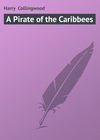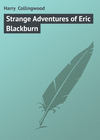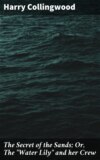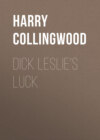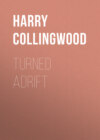Loe raamatut: «А Pirate of the Caribbees», lehekülg 11
Chapter Eleven.
Cariacou—and afterward.
As soon as the darkness had closed down sufficiently to conceal our movements, I filled away again upon the schooner, and stood in until we were within two miles of the southern extremity of the island,—which also forms the southern headland of the harbour mentioned by Garcia,—when, having run well in behind the head, I again hove-to and, launching the dinghy, proceeded toward the harbour’s mouth; my crew being two men who, like myself, were armed to the teeth.
We pulled in with muffled oars, and in due time arrived within a stone’s throw of the shore. The coast here proved to be precipitous and rocky, the swell which set round the southern extremity of the island breaking with great violence upon the shore and rendering landing absolutely impossible; moreover, the night was so dark that—although in every other respect admirably suited for my purpose—it was impossible to clearly see where we were going, and two or three times we inadvertently got so close to the rocks that we narrowly and with the utmost difficulty avoided being dashed upon them. At length, however, we rounded the southernmost head and entered the harbour, and almost immediately afterwards made out a narrow strip of sandy beach, upon which I landed without difficulty, leaving the two men to look after the dinghy and lay off a few yards from the shore, ready to pull in again and take me aboard at a moment’s notice if necessary.
Having landed, I ascended a rather steep, grassy slope, some seventy or eighty feet high, and stood to look about me. The harbour was quite a spacious affair, the entrance being about half a mile wide, while the harbour itself seemed—so far as I could make out in the darkness—to be quite two miles long. The general shape of this inlet immediately suggested to me the conviction that if, as Garcia had informed me, Morillo really had established his headquarters here, he would be almost certain to have constructed a couple of batteries—one on each headland—to defend the place; and I at once set about the task of ascertaining how far my conjecture might happen to be correct. Toward the eastward from where I had halted the land continued to rise in a sort of ridge, culminating in what had the appearance of a knoll, and it struck me that, if a battery really existed on that side of the harbour, I ought to find it not far from this spot. I accordingly wended my way toward it as best I could, forcing a passage for myself through the grass and scrub, with a most unpleasant conviction that I might at any moment place my hand or foot upon a venomous snake or reptile of some sort; and finally, after about twenty minutes of most unpleasant scrambling, found myself alongside the “knoll,” which, as I had more than half suspected, now proved to be nothing less than a rough earthwork, mounting four thirty-two pounders.
My devious path had brought me to the face of the battery, so I had to clamber up the steep face of the slope before I could get a view of the interior. This I did, entering the battery through one of the embrasures, when I found myself standing upon a level platform constituting the floor of the battery. Keeping carefully within the deep shadow of the gun, and crouching down upon my hands and knees, I at once proceeded to reconnoitre the place, and presently made out a couple of huts, the smaller of which I concluded must be the magazine, while the larger probably accommodated the garrison. Both were in utter darkness, however, and my first impression was that they were untenanted; but, to make quite certain, I crept very softly up to the larger building, and, finding a closed door, listened intently at it. For a few seconds I heard nothing save the sough of the night breeze through the branches of some cotton-wood trees that grew close at hand, but presently I detected a sound of snoring in the interior, which, as I listened, grew momentarily more distinct and unmistakable. The sounds certainly emanated from more than one sleeper; I thought that there were probably at least three or four of them at work, but my hearing was not quite keen enough to enable me to accurately differentiate the sounds and thus arrive at the correct number of those who emitted them. They were, however, sound asleep, and therefore not likely to be disturbed by a slight noise. Moreover, the hut was well to windward, and the sough and swish of the wind through the cotton-woods seemed powerful enough to drown such slight sounds as I might be likely to make; so I stole softly across the open area to the nearest gun, which I at once proceeded to carefully spike with the aid of some nails and a leather-covered hammer with which I had provided myself. Despite the deadening effect of the leather the hammer still made a distinct “clink,” which to my ears sounded loud enough to wake the dead; but a few seconds’ anxious work sufficed to effectually spike the first gun, and as nobody appeared to have heard me, I then proceeded to spike the next, and the next, until I had rendered all four of them harmless. This done, I slipped out of the same embrasure by which I had entered, and successfully made my way back to the beach and to the spot off which the dinghy lay awaiting me.
The presence of a battery on the south head of the harbour entrance convinced me that there must also be a similar structure on the north head. As soon, therefore, as I found myself once more aboard the dinghy, I headed her straight across the mouth, reaching the northern side in about twenty minutes. Half an hour’s search enabled me to find the battery which I was looking for,—which proved to be a pretty exact counterpart of the one I had already visited,—and here again I succeeded in spiking all four of the guns without discovery. This I regarded as a fairly successful night’s work; so, as we should have to be stirring pretty early in the morning, I now returned to the schooner, and, having hove her to with her head off shore, turned in and had a good night’s rest.
At daybreak on the following morning I was called by Black Peter, and within ten minutes I was on deck. We were then some eight miles off the land, with the schooner heading to the eastward; but we at once wore round and bore straight away for the harbour’s mouth, clearing for action and making all our arrangements as we went.
An hour’s run, with the wind well over our starboard quarter, brought us off the mouth of the harbour, which we at once entered; and as soon as we were fairly inside, the schooner was hove-to, and two boats were lowered, each carrying eleven men armed to the teeth, in addition to the officer in command. One of the boats was commanded by Christie and the other by Lindsay; and their mission was to capture the two batteries commanding the harbour’s mouth, and blow them up before the spiked cannon could be again rendered serviceable. I brought the telescope to bear upon the batteries as soon as we were far enough inside the harbour to get a sight of them, and was amused to observe that there was a terrible commotion going on in both. Our presence had been promptly discovered, and the first attempt to open fire upon us had resulted in the discovery that their guns were all spiked. Of course it was by no means an easy matter to estimate the strength of the garrisons of these batteries, but I calculated that it would probably total up to about thirty men to each battery; and as they would be nearly or quite all Spaniards, I felt that the boats’ crews which I had sent away would be quite strong enough to satisfactorily account for them. Nor was I disappointed; for although the pirates opened a brisk musketry fire upon our lads the moment that they were fairly within range, the latter simply swarmed up the hill and carried the two batteries with a rush, the pirates retreating by the rear as the Terns clambered in through the embrasures. The moment that the boats shoved off from the schooner’s side I saw that the spirit of emulation had seized upon the two crews, for they both went away at a racing pace, and their actions throughout were evidently inspired by this same spirit; the result of which was that the two batteries were destroyed within five minutes of each other, while the whole affair, from the moment when the boats shoved off to the moment when they arrived alongside again, was accomplished within an hour and a quarter, and that, too, without any loss whatever on our side, or even a wound severe enough to disable the recipient. The pirates were less fortunate, their loss in the two batteries amounting to five killed, and at least seven wounded severely enough to render them incapable of escaping. These seven were brought on board by our lads, and secured below immediately upon their arrival.
Meanwhile I had not been idle, for while the boats were away I had employed my time in making, with the aid of the telescope, a most careful inspection of this piratical stronghold; and I was obliged to admit to myself that it would be difficult to imagine—and still more difficult to find—a spot more perfectly adapted in every way for its purpose. The harbour itself was spacious enough to hold a fleet, and almost completely land-locked, so that, once inside, a ship was perfectly concealed; while the fact that the opening faced in a south-westerly direction rendered it absolutely safe in all weathers. And, so far as enemies were concerned, the two batteries at the harbour’s mouth were so admirably placed that they ought to have proved amply sufficient for the defence of the place; and no doubt they would have so proved in other hands, or had a proper lookout been kept. That they had fallen so easily to us was the fault, not of Morillo, but of the man whom he had left in command.
At the bottom of the bay or inlet—for it partook of the nature of the latter rather than of the former—lay the settlement that Morillo had established, consisting of no less than seventeen buildings. There was also a small wharf, with a brig lying alongside it.
The moment that the boats arrived alongside I ordered the men out of them, and had them dropped astern, when sail was made and we stood down toward the settlement, with our ensign flying at the gaff-end. As we drew near I was able to make out that here too our presence was productive of a tremendous amount of excitement; and presently fire was opened upon us from a battery of six nine-pounders that had been constructed on the rising ground immediately to the rear of the wharf, while the black flag was boldly run up on a flagstaff close at hand. It did not suit my purpose, however, to engage in a running fight; I therefore bore down upon the brig—discharging our port broadside at the battery when we were within pistol-shot of it—and, running alongside, grapnelled her. This done, every man Jack of us swarmed ashore, Lindsay holding the wharf with a dozen of our lads, while Christie and I, with the remainder of the crew, made a rush for the battery and took it. Ten minutes sufficed us to spike the guns and blow up the magazine, which done, we found ourselves masters of the whole place, the inhabitants having taken to flight the moment that this third battery fell into our hands.
We now proceeded to make a leisurely inspection of the place, with the result that we discovered it to be quite a miniature dockyard, with storehouses, mast-houses, rigging and sail-lofts all complete; in fact, there was every possible convenience for repairing and refitting a ship. Nor was this all; there was also a large magazine full of ammunition, quite an armoury of muskets, pistols, and cutlasses, and several dismounted guns, ranging from six-pounders to thirty-two pound carronades; while the storehouses were well stocked with provisions and stores of every possible description. One large building immediately facing the wharf was apparently used as a receptacle for plunder, for we found several bales of stuff that had evidently formed part of a cargo, or cargoes, but there was surprisingly little of it, which was accounted for, later on, by the discovery that the brig was full of plunder to the hatches. In addition to the buildings which were in use as stores, there were two most comfortably fitted up as barracks, while at the back of the settlement and well up the side of the hill stood a little group of seven handsome timber dwelling-houses, each standing in its own garden and nestling among the lofty trees that clothed the hillside.
Having secured complete possession of the place, my first care was to have the small amount of plunder that lay in the storehouse, and the guns, conveyed on board the Tern and sent down her main hatchway. This job took us about two hours, during which a few shots were occasionally fired at us from the woods; but as the bullets all fell short, we did not trouble ourselves to go in pursuit of the individuals who were firing upon us. Our next act was to blow up the magazine, thus destroying the whole of the pirates’ stock of ammunition; and when this had been successfully accomplished, we went systematically to work, and set fire to the whole of the storehouses and barracks, one after the other, until the whole place was in flames. Finally, we turned our attention to the seven dwelling-houses on the hillside. These proved, to our astonishment, to be most elegantly and sumptuously furnished in every respect, the only peculiarity noticeable being a lack of uniformity among the articles contained in some of the houses, plainly showing that they had been gathered together at different times and from different places. Evidences of female influence were abundantly present in all these houses, from which we assumed that they formed the abode of Morillo and his most important subordinates during their short sojourns in port. The six largest of these buildings we set fire to, leaving the seventh as a refuge for the unfortunate women, who were doubtless concealed at no great distance in the adjacent woods.
The burning of these houses completed the destruction of the settlement, which was accomplished absolutely without casualties of any kind on our side. We waited until the houses were well ablaze, and then retreated in good order to the harbour, a few shots being fired at us here and there from ambush as we went; but as we were well out of range I took no notice of them, and in due time we arrived once more on the wharf.
Our next business was to take possession of the brig, which we did forthwith, Christie, with eight hands, going on board her as a prize crew. She was a beamy, bluff-bowed, motherly old craft named the Three Sisters, hailing out of Port-of-Spain, and was evidently British built, her whole appearance being that of a sober, honest, slow-going trader, such as one constantly meets with, doing business among the islands. Her hold, however, was full of booty; and I conjectured that Morillo had, through his agents, purchased her in a perfectly straightforward manner for use in the conveyance of booty from Cariacou to such ports as afforded opportunity for its disposal without the asking of too many inconvenient questions.
It was the work of but a few minutes for the prize crew to transfer their few belongings from the schooner to the brig; and, this done, we got both craft under way and stood out to sea—the brig under every stitch of canvas that she could show to the breeze, while the schooner, under topsail, foresail, and jib, had to heave-to at frequent intervals to wait for her.
My first intention was to send the brig to Port Royal in charge of the prize crew alone, remaining off the island in the Tern until Morillo should appear—as he would be certain to do, sooner or later—in his brigantine. A little reflection, however, caused me to alter my plans and to determine upon escorting the Three Sisters to her destination, lest she should haply encounter Morillo on the way, in which case the fate of her defenceless prize crew would probably be too dreadful to bear thinking about. As soon, therefore, as we were clear of the harbour I set the course for Jamaica, and away we both went, cheek by jowl, the brig—with a roaring breeze over her starboard quarter—reeling off her six and a half knots per hour with as much fuss and splutter as though she were going fifteen!
For the first two days nothing of any importance occurred. On the third night out from Cariacou, however,—or, to be strictly accurate, about two o’clock in the morning,—it being my watch on deck, the night dark and somewhat overcast, two sails were sighted on our starboard bow, heading to the eastward on the port tack, and steering a course which would bring them close to us. One of them was a craft of considerable size, the other a small vessel; and from the moment that these two facts became apparent, I made up my mind that one was the prize of the other, though which of the two was the captor, there was just then no means of ascertaining. The smaller craft was perhaps a privateer, and the big one her prize; or—quite as likely—the big craft might be a frigate, and the small craft her prize. In either case, however, it behoved me to be very careful; for one of the two was almost certain to be an enemy, and if she happened to be also the captor of the other it was more than probable she would tackle us. From the moment, therefore, when we first sighted them, I never allowed the night-glass to be off them for more than a few seconds at a time.
When first discovered, they were hull down, and only just distinguishable in the darkness as two vague blots of black against the lowering gloom of the night sky; but the trade wind was piping up rather stronger than usual that night, while we and the strangers were approaching each other on a nearly straight line. We consequently closed each other rapidly, and within about twenty minutes from the moment of their discovery we were able to make out that one of the twain was a full-rigged ship, while the other seemed to be a large brigantine; and a few minutes later I discovered that the ship was showing a much broader spread of canvas than the brigantine, thus proving the latter to be the faster craft of the two. It was scarcely likely, therefore, that the ship was a frigate; and if not that, she must be a merchantman, and doubtless the prize of the brigantine.
At this point, the question suggested itself to me: Might not the brigantine be Morillo’s craft? She appeared to be about the same size, so far as it was possible to distinguish in the darkness; and if so, it would fully account for the boldness with which she held on upon her course, instead of heaving about and endeavouring to avoid a possible enemy—for doubtless they had made us out almost if not quite at the same time as we had discovered them. I most fervently hoped it might be as I surmised, for, if so, I should have the fellow at advantage, inasmuch as he would doubtless have put a fairly strong prize crew on board the ship, which would proportionately weaken his own crew. Full of the hope that this Ishmael of the sea might be about to place himself within my power, I caused all hands to be called, and, having first made sail, sent them to quarters, the gunner at the same time descending to the magazine and sending up a plentiful supply of powder and shot. By the time that we were ready, the brigantine and her consort had neared us to within a couple of miles, the two craft closing meanwhile, doubtless for the purpose of communicating instructions. That they were quite prepared to fight aboard the brigantine was perfectly evident, for we could see that her deck was lit up with lanterns, the light of which, shining through her ports, enabled me to ascertain that she mounted six guns of a side. Both craft held their luff, but it was now quite clear that the brigantine was much the faster and more weatherly of the two, she walking away out to windward of the big fellow as though the latter had been at anchor the moment that she made sail in answer to our challenge.
And now ensued a little bit of manoeuvring on both sides, with the twofold object of discovering whether the stranger happened to be an enemy, and if so, to secure the weather-gage of him. We had the advantage, however, as we were running free and could haul our wind at any moment; and this advantage I kept by hauling up on the starboard tack and then heaving in stays with the topsail aback, waiting for the brigantine to close; which she presently did, ranging up within biscuit-toss of our lee quarter. She was now so close to us that, despite the darkness, it was quite possible to make out details; and it was with a feeling of mingled disgust and disappointment that I discovered that, whatever she might be, she certainly was not Morillo’s beautiful but notorious brigantine.
She was, however, in all probability an enemy,—it seemed to me that, so far as I could make out in the uncertain light of the partially clouded stars, she had a French look about her,—so, with the idea of securing the advantage of the first hail, I sprang upon the rail as she ranged up alongside, and hailed, in Spanish—
“Ho, the brigantine ahoy! What vessel is that?”
“The Belle Diane, French privateer. What schooner is that?” came the reply, also in Spanish of the most execrable kind, uttered with an unmistakable French accent.
“His Britannic Majesty’s schooner Tern, monsieur, to which ship I must request you to surrender, or I shall be under the painful necessity of blowing you out of the water,” answered I, firmly persuaded of the policy of rendering oneself as formidable as possible to one’s enemy.
But my well-meant endeavour proved to be a signal failure; the enemy was not in this case to be so easily frightened.
“Les Anglais! mille tonnères!” I heard the Frenchman in the brigantine’s main rigging exclaim, as he waved his clenched fist in the air. Then he retorted, in what he doubtless believed to be the purest English—
“Vat is dat you say, Monsieur Angleeshman? If I do not surrendaire, you vill blow me out of de vattar? Ha, ha! Sacre! It is I, monsieur, who vill blow dat footy leetle schooner of yours into ze sky, if you do not surrendaire yourshelf plus promptement, eh!”
“All right, monsieur; blaze away, then, as soon as you like!” retorted I, in the best attempt at French I could muster. Then, to my own people, who were at quarters—
“Stand by, starboard guns! Wait until she rolls toward us. Now, fire!”
Our imposing broadside of three guns rang out at the precise moment when the brigantine rolled heavily toward us, exposing her deck to our fire; and I heard the shot go crashing through her bulwarks to the accompaniment of sundry yells and screams, that told me they had not been altogether ineffective. Almost at the same instant three of her guns replied; but their muzzles were so deeply depressed, and she was just then rolling so heavily toward us, that the shot struck the water between her and ourselves, and we neither saw nor felt any more of them. Meanwhile, our square canvas being aback, our antagonist swept rapidly ahead of us; seeing which, I filled upon the schooner and bore up under the brigantine’s stern, raking with our port broadside as we crossed her stern, immediately hauling my wind and making a half-board across her stern again to regain my position upon her weather quarter. Our starboard guns were by this time reloaded, and we gave her the three of them, double-shotted, as we recrossed her; and the tremendous clatter, with the howls and shrieks that followed this discharge, showed that we had wrought a considerable amount of execution among the Frenchmen.
“There’s something gone aboard of him, but what it is I can’t make out,” exclaimed Lindsay, who was standing close beside me. “Ah!” he continued, “I see what it is now; it is her mainboom that we have shot away. I can see the outer end of it towing overboard. And see, she is paying off; with the loss of their after-sail they can no longer keep their luff!”
It was even as Lindsay had said; we had shot away the brigantine’s mainboom, and thus rendered her big, powerful mainsail useless; so that, despite the lee helm that they were giving her, she was gradually falling off, until within a minute or two she was nearly dead before the wind. This placed her almost completely at our mercy, for we were now enabled to sail to and fro athwart her stern, raking her alternately with our port and starboard guns, and with our nine-pounder as well, while she could only reply with two guns which her people had run out through her stern ports. Still, although disabled, she was by no means beaten, her plucky crew keeping up a brisk fire upon us from these two guns until by a lucky broadside we dismounted them both. But even then they would not give in; despite the relentless fire that we continued to pour into them, they contrived after a time to get two more guns into position, with which they renewed their fire upon us as briskly as ever. This sort of thing, however, could not continue for very long; our fire was so hot and our guns were so well aimed, that we fairly drove the plucky fellows from the only two guns that they could bring to bear upon us, and within a couple of minutes of the cessation of their fire, a lantern was waved aboard the brigantine, and someone hailed that they surrendered, while at the same moment all sheets and halliards were let go and her canvas came down by the run, as a further intimation that they had had enough of it.
Upon this we of course at once ceased firing, and ranged up alongside the prize, hailing her that we would send a boat aboard. Then, for the first time, we discovered that both our large boats were so severely damaged that neither of them would float; whereupon Lindsay offered to board the prize in the dinghy, with two hands, and take possession. Accordingly, the little cockleshell of a craft was dropped over the side, and in less than two minutes my chum hailed to say that he was safely aboard, and that the execution wrought by our fire had been terrible, the brigantine having lost nearly half her crew, both the captain and the chief mate being among the killed. He added that the brigantine’s long-boat was undamaged, and that he proposed to hoist her out, with the assistance of the prisoners, and send her to us by the two hands who had manned the dinghy, if we would look out to pick her up in the event of their being unable to bring her alongside. To this I of course agreed; and a quarter of an hour later the boat was safely alongside us, with a prize crew of twelve picked men tumbling themselves and their traps into her.
Meanwhile, what had become of the Three Sisters and the big ship? I looked round for them, and behold! there they both were, about half a mile to windward, and bearing down upon us in company!
“Phew!” thought I, “here is a nice business! While we have been playing the game of hammer and tongs down here, the big ship—doubtless manned by a strong prize crew—has run alongside the old brig and taken her! And yet—can it be so? Christie has eight hands with him, and I believe the fellow would make a stout fight for it before giving in. I cannot understand it; but we shall soon see. If they have captured him we shall have to recapture him, that is all!” Then, turning to the men, who were busy securing the guns and repairing such slight damage as had been inflicted upon our rigging, I said—
“Avast, there, with those guns! Load them again, lads, for we may have to fight once more in a few minutes. Here is the big ship running down upon us, and it looks very much as though she had taken the brig. Fill your topsail, and let draw the headsheets!”
Getting sufficient way upon the schooner, we tacked and stood toward the new-comers, passing close under the stern of the ship, with the intention of hailing her. But before I could get the trumpet to my lips, a figure sprang into the ship’s mizzen rigging, and Christie’s well-known voice hailed—
“Tern ahoy! is Mr Courtenay aboard?”
“Ay, ay,” I answered; “I am here, Mr Christie. What are you doing aboard there?”
“Why,” answered Christie, “I am in charge, you know. Seeing you busy with the brigantine, I thought I might as well try my luck at the same time; so I managed somehow to put the brig alongside this ship, and—and—well, we just took her!”
“Well done, Mr Christie!” I shouted; but before I could get out another word, my voice was drowned in the roaring cheer that the Terns gave vent to as they heard the news, told in Christie’s usual gentle, drawling tones; and by the time that the cheers had died away the two craft had drawn so far apart that further conversation was, for the moment, impossible.
